Knowledge Engineering
A vast amount of information about the real-world is available today in knowledge bases and open data repositories. My latest research revolves around extracting such real-world data and finding patterns which can be used to generate complete games.
Summarizing Game Reviews: First Contact
Aris Kosmopoulos, Antonios Liapis, George Giannakopoulos and Nikiforos Pittaras
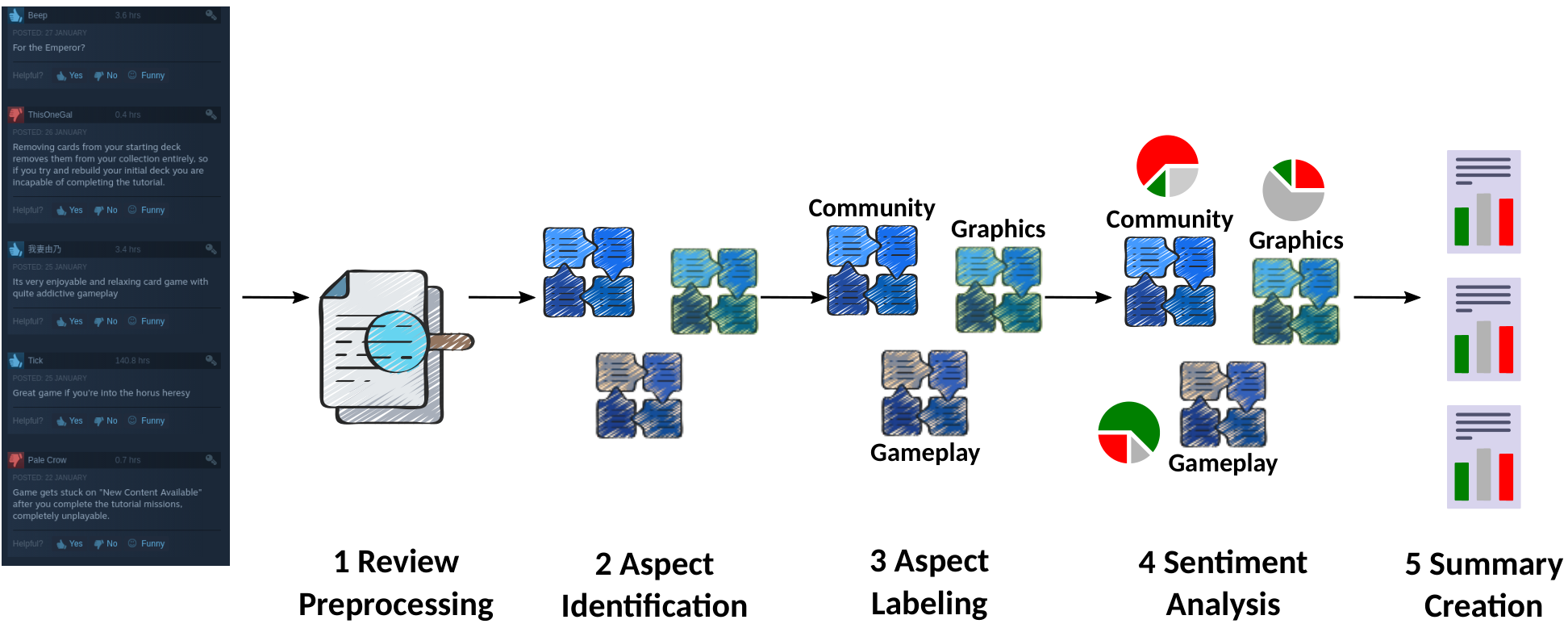
The pipeline for generating a review summary by first clustering the review text into 6 pre-made aspects and using text sentiment analysis to choose which sentences from existing users to show to the user as a summary per aspect.
Abstract: In recent years the number of players that are willing to submit a video game review has increased drastically. This is due to a combination of factors such as the raw increase of video gamers and the wide use of gaming platforms that facilitate the review submission process. The vast data produced by reviewers make extracting actionable knowledge difficult, both for companies and other players, especially if the extraction is to be completed in a timely and efficient manner. In this paper we experiment with a game review summarization pipeline that aims to automatically produce review summaries through aspect identification and sentiment analysis. We build upon early experiments on the feasibility of evaluation for the task, designing and performing the first evaluation of its kind. Thus, we apply variants of a main analysis pipeline on an appropriate dataset, studying the results to better understand possible future directions. To this end, we propose and implement an evaluation procedure regarding the produced summaries, creating a benchmark setting for future works on game review summarization.
in Proceedings of the SETN workshop on Games and AI, 2020. BibTex
Using Dates as Contextual Information for Personalized Cultural Heritage Experiences
Ahmed Dahroug, Andreas Vlachidis, Antonios Liapis, Antonis Bikakis, Martin Lopez-Nores, Owen Sacco and Jose Juan Pazos-Arias

Associations discovered, explained, and visualized for a synthetic persona (a naturist German couple) visiting the Archaeological Museum of Tripoli and interested in the keywords "Nudity", "Marriage" and "Mythology"
Abstract: We present semantics-based mechanisms that aim to promote reflection on cultural heritage by means of dates (historical events or annual commemorations), owing to their connections to a collection of items and to the visitors' interests. We argue that links to specific dates can trigger curiosity, increase retention and guide visitors around the venue following new appealing narratives in subsequent visits. The proposal has been evaluated in a pilot study on the collection of the Archaeological Museum of Tripoli (Greece), for which a team of humanities experts wrote a set of diverse narratives about the exhibits. A year-round calendar was crafted so that certain narratives would be more or less relevant on any given day. Expanding on this calendar, personalised recommendations can be made by sorting out those relevant narratives according to personal events and interests recorded in the profiles of the target users. Evaluation of the associations by experts and potential museum visitors shows that the proposed approach can discover meaningful connections, while many others that are more incidental can still contribute to the intended cognitive phenomena.
in SAGE Journal of Information Science 47(1), pp. 82-100, 2021. BibTex
A Study on Video Game Review Summarization
George Panagiotopoulos, George Giannakopoulos and Antonios Liapis
Abstract: Game reviews have constituted a unique means of interaction between players and companies for many years. The dynamics appearing through online publishing have significantly grown the number of comments per game, giving rise to very interesting communities. The growth has, in turn, led to a difficulty in dealing with the volume and varying quality of the comments as a source of information. This work studies whether and how game reviews can be summarized, based on the notions pre-existing in aspect-based summarization and sentiment analysis. The work provides suggested pipeline of analysis, also offering preliminary findings on whether aspects detected in a set of comments can be consistently evaluated by human users.
in Proceedings of the MultiLing Workshop: Summarization Across Languages, Genres and Sources, 2019. BibTex
Real-world Data as a Seed
Antonios Liapis
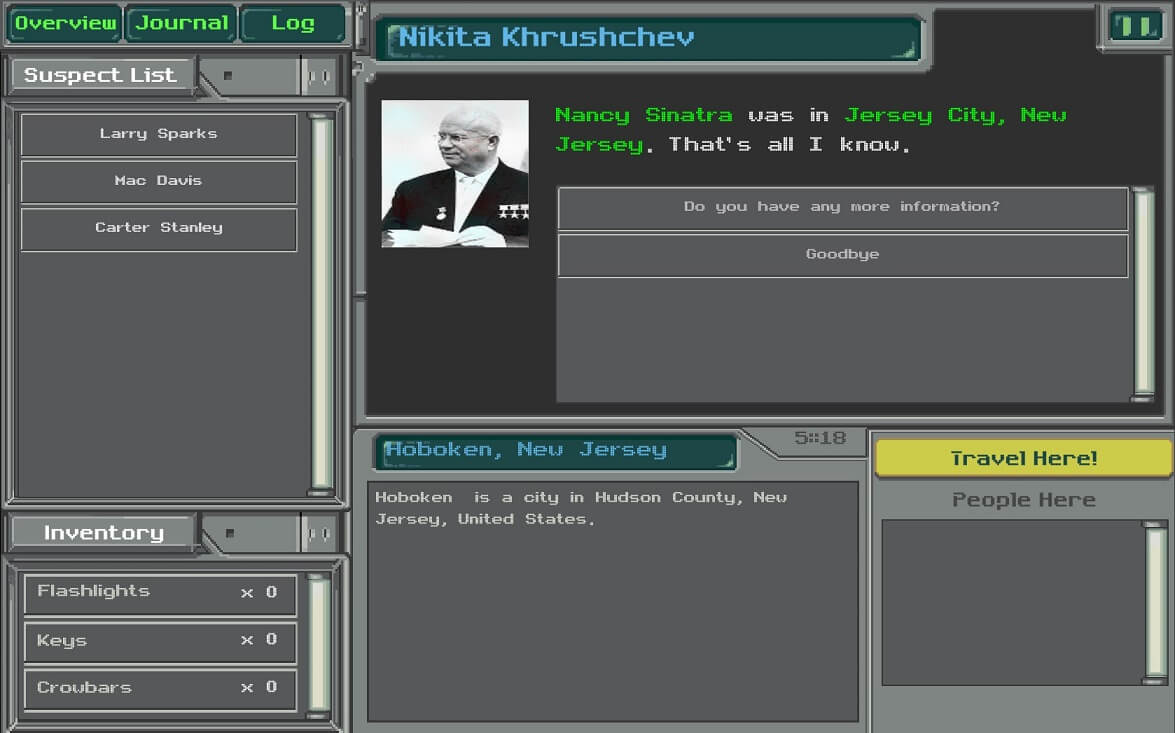
Screenshot of the DATA Agent game, where a player tries to identify the location of a murder suspect.
Abstract: This article proposes the use of real-world data for game generation, and describes the design priorities of DATA Agent as an example of data-driven game generation. Due to the use (and transformation) of real-world data, DATA Agent weaves a narrative of a time-travelling doppelganger murderer and a time-traveling detective intent on catching the murder in a lie about its presumed identity. DATA Agent shows how real-world data from Wikipedia, Wikimedia Commons and OpenStreetMap can be transformed into NPCs, levels, plot points and exposition dialog.
in Seeds: The Procjam Zine 3. 2018. BibTex
DATA Agent
Michael Cerny Green, Gabriella A. B. Barros, Antonios Liapis and Julian Togelius
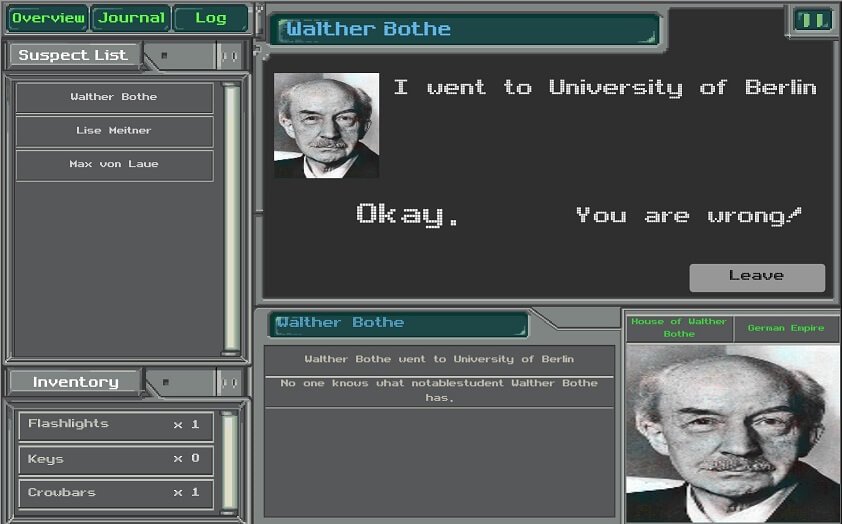
Screenshot of the user interface of the DATA Agent game: in this example game, Albert Einstein has been murdered by a time-travelling doppelganger, and the suspects are physicists Walter Bothe, Lise Meitner and Max von Laue. Here, the player interrogates Walter Bothe, checking whether the facts collected from other sources match the facts uttered by the suspect.
Abstract: This paper introduces DATA Agent, a system which creates murder mystery adventures from open data. In the game, the player takes on the role of a detective tasked with finding the culprit of a murder. All characters, places, and items in DATA Agent games are generated using open data as source content. The paper discusses the general game design and user interface of DATA Agent, and provides details on the generative algorithms which transform linked data into different game objects. findings from a user study with 30 participants playing through two games of DATA Agent show that the game is easy and fun to play, and that the mysteries it generates are straightforward to solve.
in Proceedings of the 13th Conference on the Foundations of Digital Games, 2018. BibTex
Data-driven Design: A Case for Maximalist Game Design
Gabriella A. B. Barros, Michael Cerny Green, Antonios Liapis and Julian Togelius
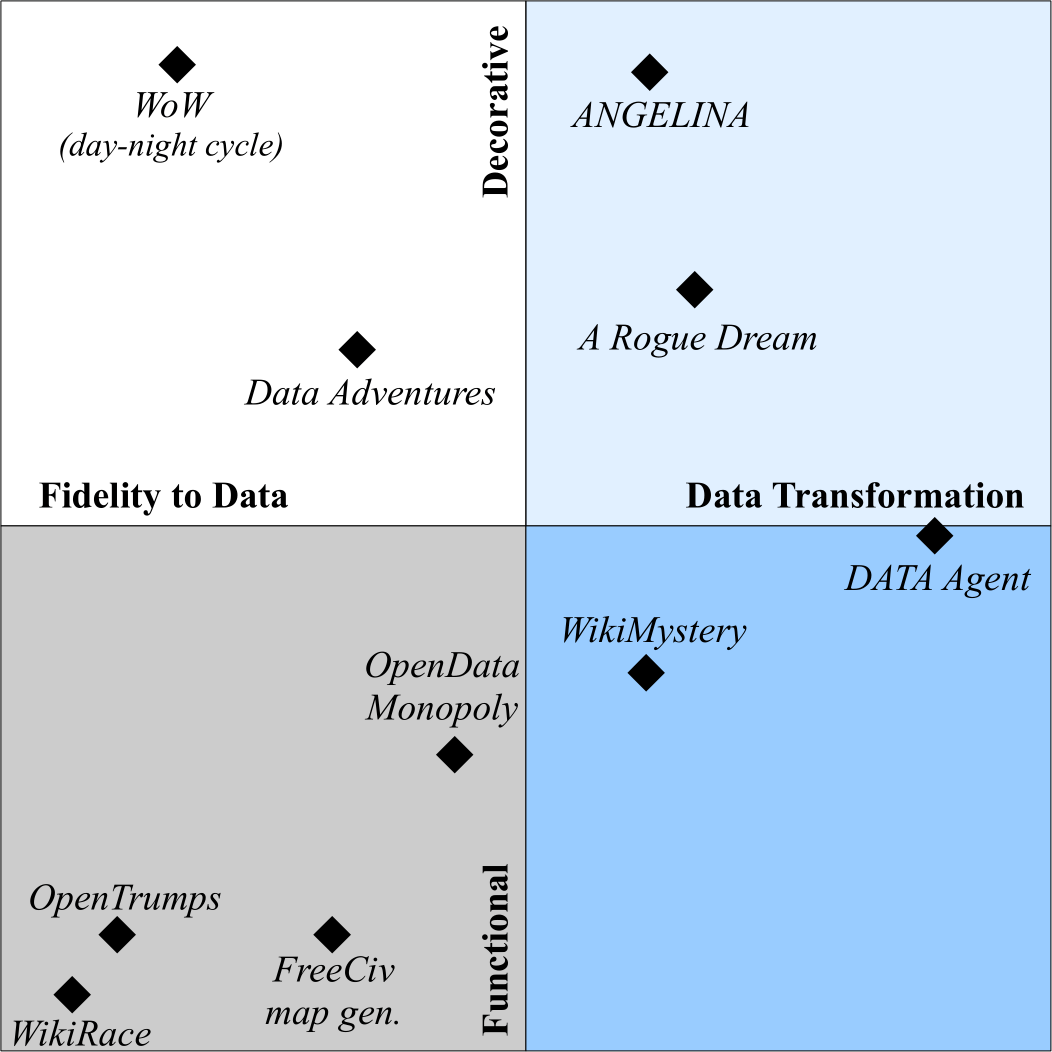
Examples of games along the dimensions of data versus game fidelity and functional versus decorative role.
Abstract: Maximalism in art refers to drawing on and combining multiple different sources for art creation, embracing the resulting collisions and heterogeneity. This paper discusses the use of maximalism in game design and particularly in data games, which are games that are generated partly based on open data. Using Data Adventures, a series of generators that create adventure games from data sources such as Wikipedia and OpenStreetMap, as a lens we explore several tradeoffs and issues in maximalist game design. This includes the tension between transformation and fidelity, between decorative and functional content, and legal and ethical issues resulting from this type of generativity. This paper sketches out the design space of maximalist data-driven games, a design space that is mostly unexplored.
in Proceedings of the International Conference of Computational Creativity, 2018. BibTex
Who Killed Albert Einstein? From Open Data to Murder Mystery Games
Gabriella A. B. Barros, Michael Cerny Green, Antonios Liapis and Julian Togelius
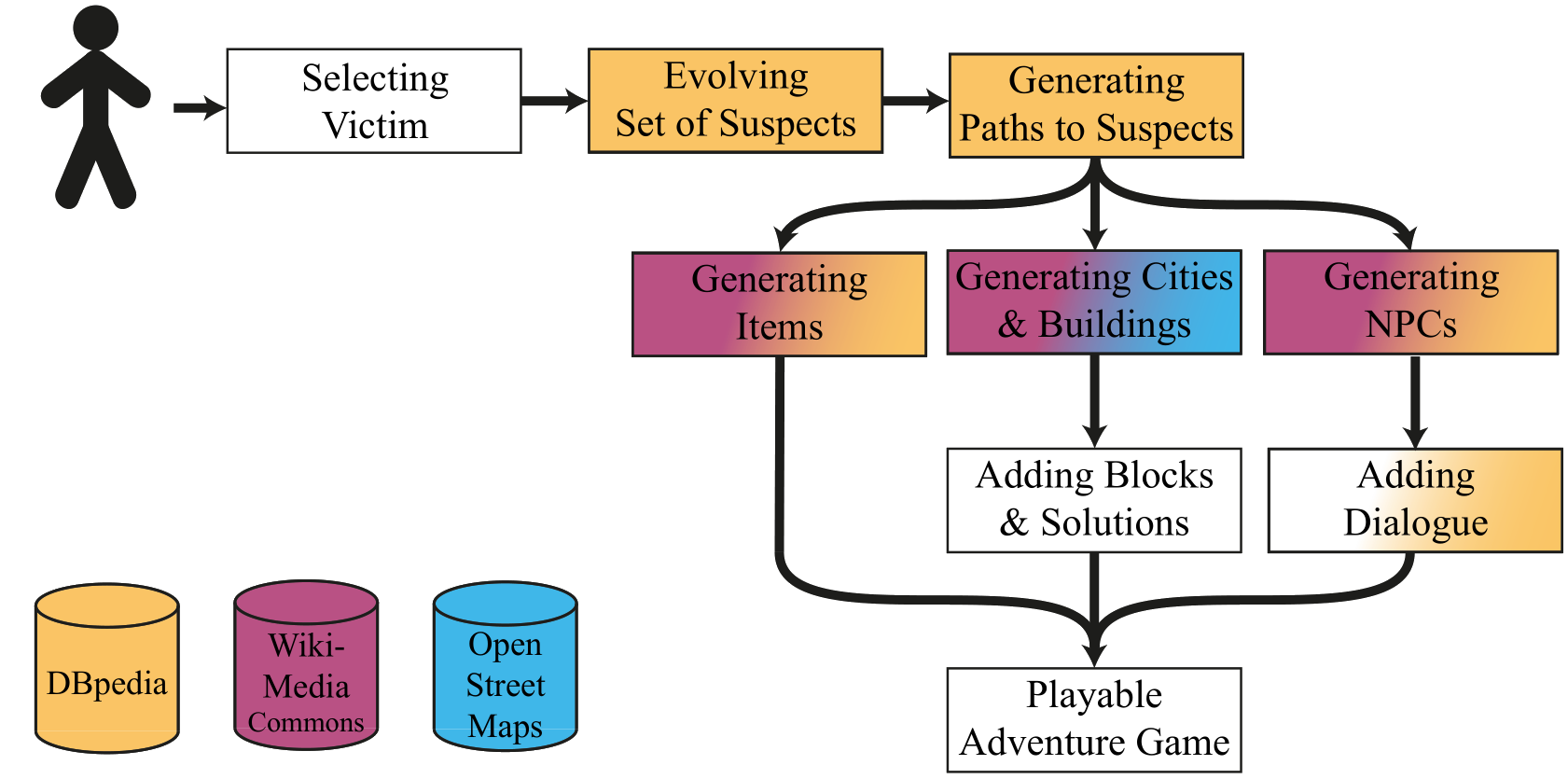
flowchart of WikiMystery and its open data sources.
Abstract: This paper presents a framework for generating adventure games from open data. Focusing on the murder mystery type of adventure games, the generator is able to transform open data from Wikipedia articles, OpenStreetMap and images from Wikimedia Commons into WikiMysteries. Every WikiMystery game revolves around the murder of a person with a Wikipedia article, and populates the game with suspects who must be arrested by the player if guilty of the murder or absolved if innocent. Starting from only one person as the victim, an extensive generative pipeline finds suspects, their alibis, and paths connecting them from open data, transforms open data into cities, buildings, non-player characters, locks and keys and dialog options. The paper describes in detail each generative step, provides a specific playthrough of one WikiMystery where Albert Einstein is murdered, and evaluates the outcomes of games generated for the 100 most influential people of the 20th century.
in Transactions on Games, vol. 11, no 1, pp. 79-89, 2019. BibTex
Game Character Ontology (GCO): A Vocabulary for Extracting and Describing Game Character Information from Web Content
Owen Sacco, Antonios Liapis and Georgios N. Yannakakis
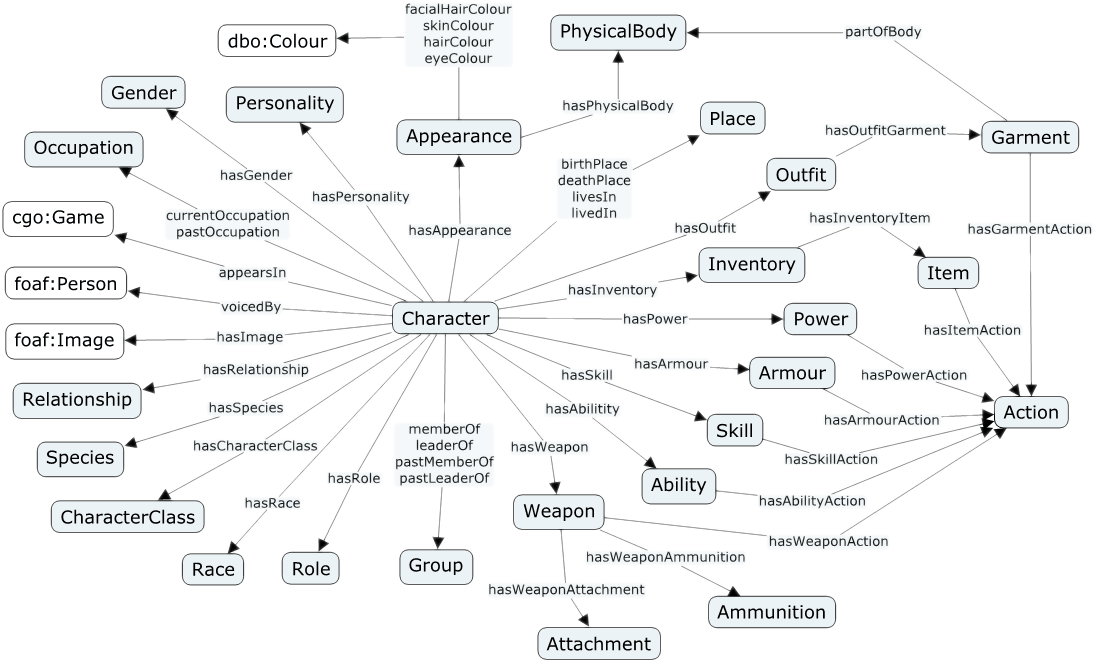
Overview of the Game Character Ontology (GCO).
Abstract: Creating video games that are market competent costs in time, effort and resources which often cannot be afforded by small-medium enterprises, especially by independent game development studios. As most of the tasks involved in developing games are labour and creativity intensive, our vision is to reduce software development effort and enhance design creativity by automatically generating novel and semantically-enriched content for games from Web sources. In particular, this paper presents a vocabulary that defines detailed properties used for describing video game characters information extracted from sources such as fansites to create game character models. These character models could then be reused or merged to create new unconventional game characters.
In Proceedings of the International Conference on Semantic Systems, 2017. BibTex
A Holistic Approach for Semantic-Based Game Generation
Owen Sacco, Antonios Liapis and Georgios N. Yannakakis
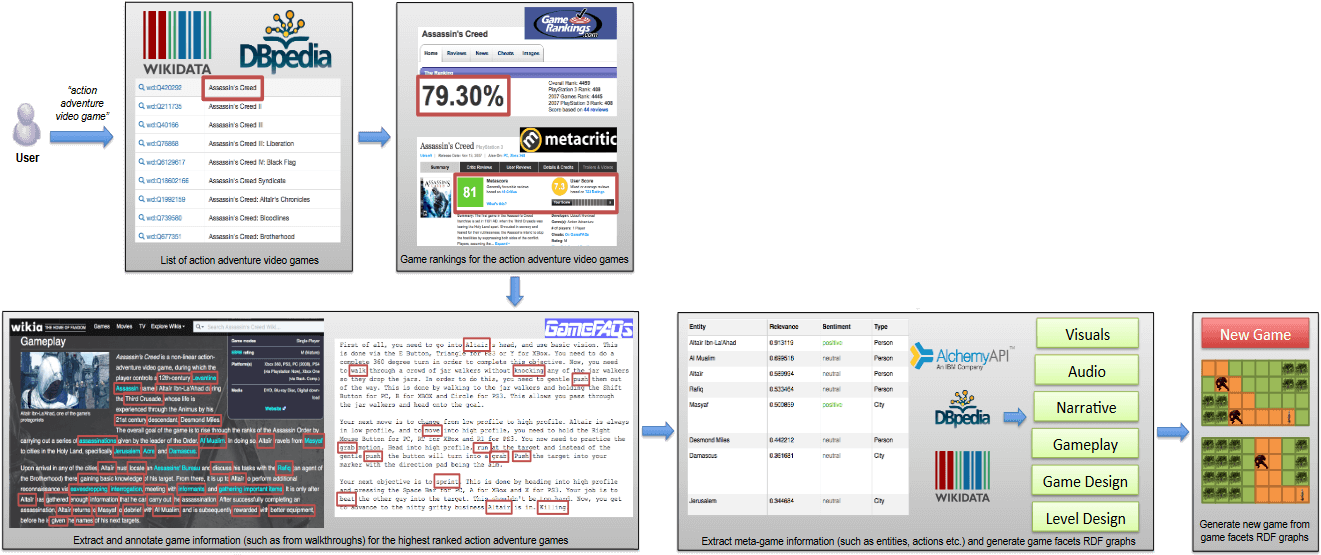
An outline of the vision for game generation from semantic information in game repositories.
Abstract: The Web contains vast sources of content that could be reused to reduce the development time and effort to create games. However, most Web content is unstructured and lacks meaning for machines to be able to process and infer new knowledge. The Web of Data is a term used to describe a trend for publishing and interlinking previously disconnected datasets on the Web in order to make them more valuable and useful as a whole. In this paper, we describe an innovative approach that exploits Semantic Web technologies to automatically generate games by reusing Web content. Existing work on automatic game content generation through algorithmic means focuses primarily on a set of parameters within constrained game design spaces such as terrains or game levels, but does not harness the potential of already existing content on the Web for game generation. We instead propose a holistic and more generally-applicable game generation solution that would identify suitable Web information sources and enrich game content with semantic meta-structures.
in Proceedings of the IEEE Conference on Computational Intelligence and Games (CIG). 2016. BibTex
Murder Mystery Generation from Open Data
Gabriella A. B. Barros, Antonios Liapis and Julian Togelius
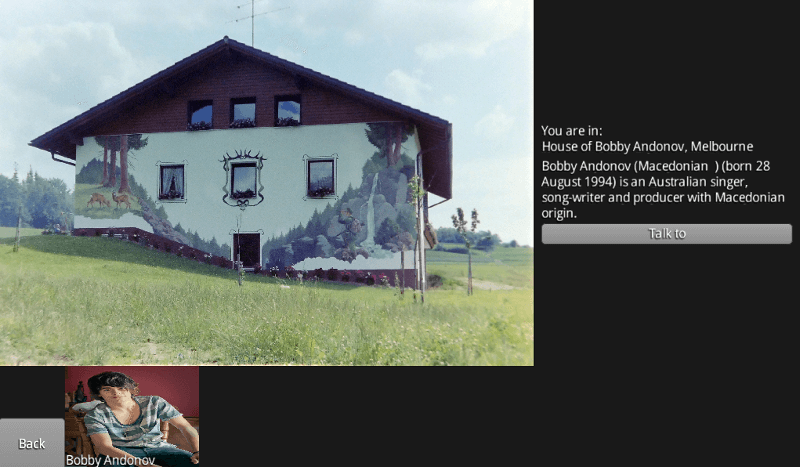
Screenshot of the 'house of Bobby Andonov' location with the NPC Bobby Andonov. In the generated game, this NPC is a suspect for the murder of the NPC Justin Bieber.
Abstract: This paper describes a system for generating murder mysteries for adventure games, using associations between real-world people mined from Wikipedia articles. A game is seeded with a real-world person, and the game discovers suitable suspects for the murder of a game character instantiated from that person. Moreover, the game discovers characteristics of the suspects which can act as clues for the player to narrow down her search for the killer. The possible suspects and their characteristics are collected from Wikipedia articles and their linked data, while the best combination of suspects and characteristics for a murder mystery is found via evolutionary search. The paper includes an example murder mystery generated by the system revolving around the (hypothetical) death of a contemporary celebrity.
in Proceedings of the International Conference on Computational Creativity. 2016. BibTex
Playing with Data: Procedural Generation of Adventures from Open Data
Gabriella A. B. Barros, Antonios Liapis and Julian Togelius
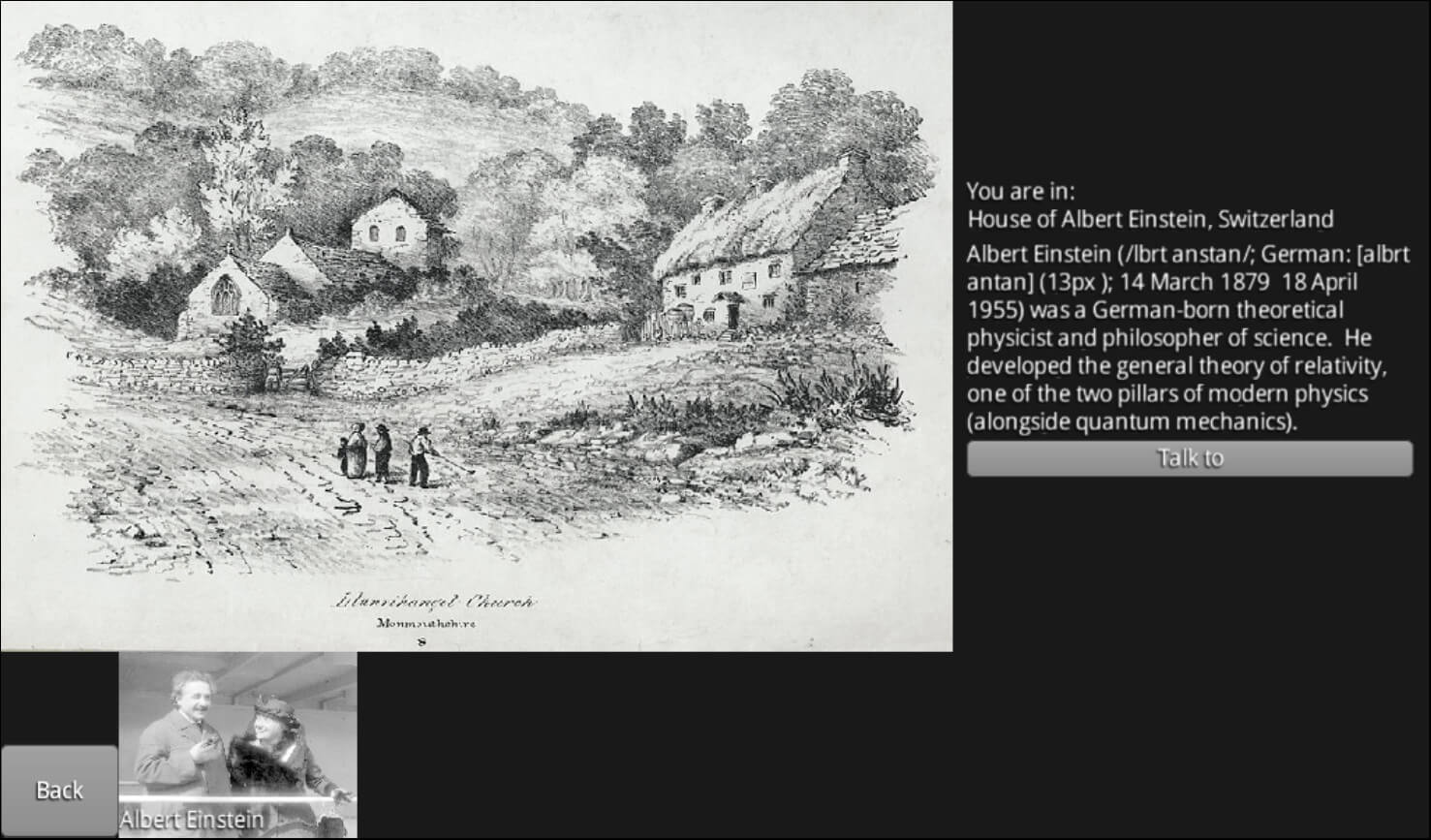
User interface of the building screen, showing Albert Einstein's house: the player can ask for directions from Albert Einstein to find Margaret Thatcher.
Abstract: This paper investigates how to generate simple adventure games using open data. We present a system that creates a plot for the player to follow based on associations between Wikipedia articles which link two given topics (in this case people) together. The Wikipedia articles are transformed into game objects (locations, NPCs and items) via constructive algorithms that also rely on geographical information from OpenStreetMaps and visual content from Wikimedia Commons. The different game objects generated in this fashion are linked together via clues which point to one another, while additional false clues and dead ends are added to increase the exploration value of the final adventure game. This information is presented to the user via a set of game screens and images. Inspired by the "Where in the World is Carmen Sandiego?" adventure game, the end result is a generator of chains of followable clues.
in Proceedings of the International Joint Conference of DiGRA and FDG. 2016. BibTex
Data Adventures
Gabriella A. B. Barros, Antonios Liapis and Julian Togelius
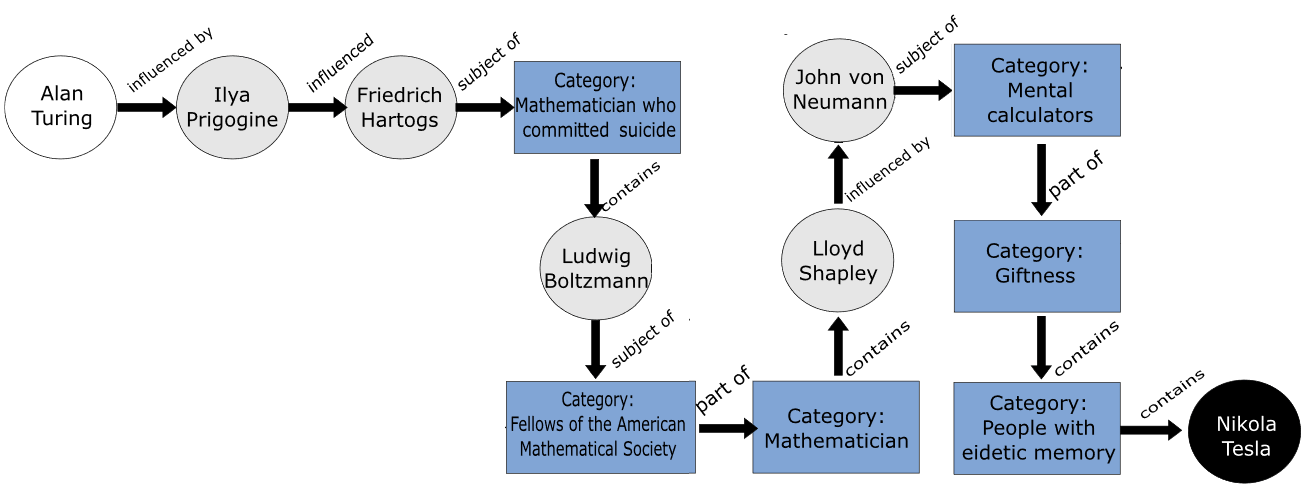
One of the possible paths between Alan Turing and Nikola Tesla, discovered via the DBpedia crawler. Each of the elements on the path is transformed into a game asset (a non-player character, a location, or a clue) that the player can interact with in the search for Nicola Tesla.
Abstract: This paper outlines a system for generating adventure games based on open data, and describes a sketch of the system implementation at its current state. The adventure game genre has been popular for a long time and differs significantly in design priorities from game genres which are commonly addressed in PCG research. In order to create believable and engaging content, we use data from DBpedia to generate the game's non-playable characters locations and plot, and OpenStreetMaps to create the game's levels.
in Proceedings of the FDG workshop on Procedural Content Generation in Games, 2015. BibTex